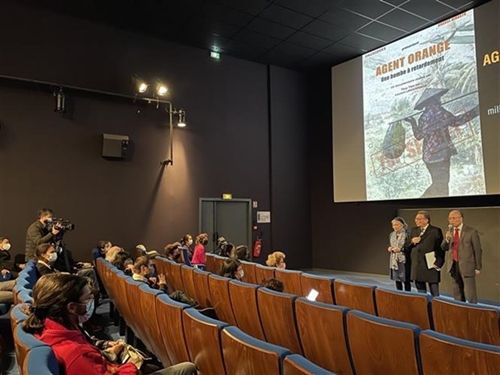The film, titled “Chat doc da cam - Qua bom no cham” (Agent Orange - A delayed-action bomb), was produced in 2013 under the direction of Ho Thuy Tien and Laurent Lindebrings. Screened at Paul Eluard Theatre, it attracted a large number of local residents.
    |
 |
|
The film screening at Paul Eluard Theatre in Choisy-le-Roi city on February 10 |
In his remarks prior to the screening, Vietnamese Ambassador to France Dinh Toan Thang thanked the support of local residents and the France - Vietnam Friendship Association in Choisy-le-Roi for the Vietnamese people, especially AO/dioxin victims.
He stated the assistance and solidarity from international friends will help ease the pain suffered by the victims and enhance their determination in the fight for justice.
Following the screening, the audience joined in a talk with Tran To Nga, an 80-year-old Vietnamese-French woman and also an AO/dioxin victim, about the destructive toxin’s impacts on human health and the environment.
According to Choisy-le-Roi Mayor Tonino Panetta, the film screening aimed to honor Nga’s fight for justice and also demonstrated his city’s support for her and other AO/dioxin victims in Vietnam
The official said he hopes through this event, locals would understand that war is not the only solution to problems, and that regardless of victory or loss, the result of every war is only disaster and to Vietnam, that disaster is AO/dioxin.
On this occasion, the France - Vietnam Friendship Association in Choisy-le-Roi called for both material and spiritual support for AO/dioxin victims in Vietnam and for solidarity with Nga in the lawsuit against the chemical companies that produced or supplied herbicides for the U.S. troops during wartime.
In 2014, Nga, who used to be a war correspondent in south Vietnam during wartime, sued the multinational companies, including Monsanto - Bayer, that produced or supplied herbicides for the U.S. during the war in Vietnam.
On May 10, 2021, the Crown Court of Evry city in the suburbs of Paris rejected her lawsuit, citing it did not have jurisdiction to hear the case, a ruling that disappointed the Vietnamese and international public.
However, Nga and her lawyers decided to file an appeal, and the struggle for justice for AO/dioxin victims is still underway.
From 1961 to 1971, the U.S. military sprayed 80 million liters of herbicides which contained about 400kg of dioxin - one of the most toxic substances, on Vietnam. Over the last 60 years, effects of this deadly chemical have still lingered in land, water, and many people’s bodies. More than 4.8 million Vietnamese people are suffering from its consequences.
Every year, Vietnam reserves more than 10 trillion VND (over 440 million USD) from its budget for providing aid and health care for AO/dioxin victims and for assisting the disadvantaged areas severely affected by the herbicides.
Source: VNA